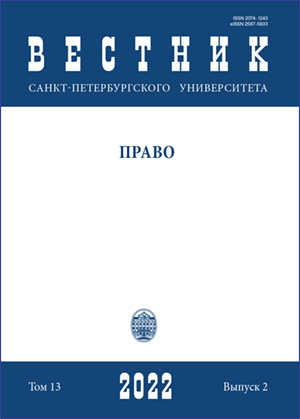Implementation and protection of human rights on the Internet: Problems of ratio and balance
DOI:
https://doi.org/10.21638/spbu14.2022.217Abstract
The Constitution of the Russian Federation enshrines one of the important postulates on the formation of the rule of law and civil society: a person and his rights and freedoms are of the highest value. In the modern period of development of information technologies, mankind entered into active communication relations through the global information and telecommunication network Internet, which in turn sharply raised the issue of the need to ensure effective protection of human and civil rights and freedoms in the process of interaction through the Internet, while maintaining a high level of guarantees for the realization of such rights and freedoms, as required by the fundamental international legal acts. The Russian Federation also did not stand aside from the above processes and was forced to take measures to protect the rights and freedoms of its citizens on the Internet, which, however, often boiled down to the introduction of new prohibitions and restrictions on such rights and freedoms. The authors of this article have made an attempt, taking into account the practice of the European Court of Human Rights and the Constitutional Court of the Russian Federation, to indicate the main directions for improving domestic federal legislation, in order to reflect in it the principle of the need to find a balance between the free implementation and protection of human and civil rights and freedoms in information and telecommunication network Internet. So that the actual problems of the realization of human rights and freedoms, due to the peculiarities of their implementation on the Internet, necessarily require the development of the most effective mechanisms for their protection in the new conditions of implementation, and not a complete rejection of the implementation of such rights and freedoms under the pretext of protecting them.
Keywords:
Constitution, Internet, society, human rights, protection of human rights, guarantees of human rights
Downloads
References
Downloads
Published
How to Cite
Issue
Section
License
Articles of "Vestnik of Saint Petersburg University. Law" are open access distributed under the terms of the License Agreement with Saint Petersburg State University, which permits to the authors unrestricted distribution and self-archiving free of charge.






